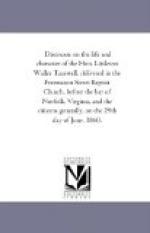But the occasion which impressed his hearers most deeply with a sense of his abilities, was a discussion on the tenure of the judicial office, in which Chief Justice Marshall, Philip P. Barbour, Stanard, Scott, Giles, and others took part. Each speaker was conscious of the powers of his opponent; posterity, in the presence of the skilful reporter, as well as the existing generation represented by some of the ablest men, were the spectators of the combat; and a visible air of solemnity pervaded the manner of each. The question was precisely that which sprung from the repeal of the judiciary act of 1800 by the Congress of 1802, and is the nicest of all our party questions. It was a magnificent display of parliamentary tact and intellectual vigor; and I do not think that an hour of my life ever glided so insensibly away as while I listened to that debate. Blows fell fast and heavy. I saw Judge Barbour, who, though president of the Convention, as the house was in committee, engaged in the debate, fairly reel in his seat from one of Judge Marshall’s massy blows, which he returned presently with right good will; but Tazewell, if I may use a figure which presented the pith of the argument of one side, and which was frequently used by both,—Tazewell fairly “sunk the boat” under the Chief Justice. The views of Tazewell prevailed; and in such a contest, in which all were kingly, and in which the combatants were magis pares quam similes—rather equals than alike—if the victor’s wreath could with propriety be awarded to a single individual, I do not think I err in saying that it would have been assigned by a majority of the hearers to Tazewell. As an illustration of the effect of his manner and argument on the minds of able men who were opposed to him in State politics, which then raged fiercely, a gentleman from the West, who held for several years a seat in the House of Delegates and in the Council, speaking of the debate to me on the day it occurred, said: “Why, Tazewell trod down those great men as if they had been children.”




